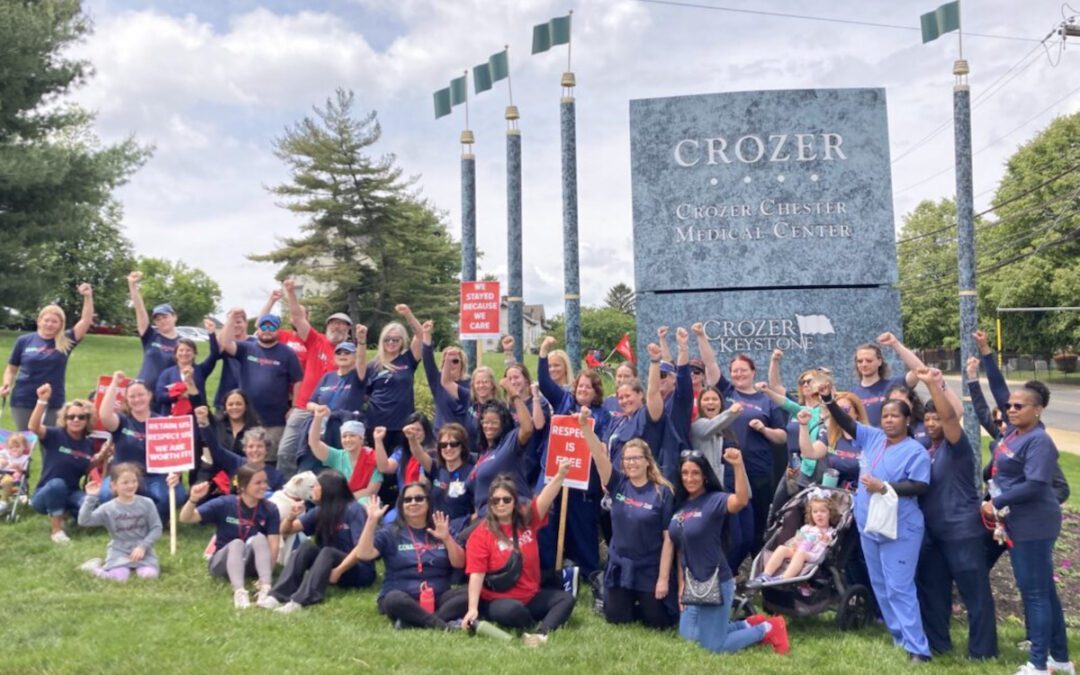
State Rep. Mary Jo Daley speaking at a reproductive rights rally in the Pennsylvania State Capitol on June 27, 2022. (Photo: Sean Kitchen)
In this op-ed, Pennsylvania resident Colin Coyle discusses how widespread misconceptions about abortion protections, despite strong polling on reproductive health as a key issue in the 2024 election, undermined Democrats’ efforts to mobilize support.
In the run-up to last year’s election, women’s reproductive health was a leading issue for many campaigns across the state. The Ehasz campaign had run internal polling which showed that when voters were educated on Rep. Brian Fitzpatrick’s past support of a federal bill banning abortion, they moved strongly in her camp. Polling by the University of Maryland and by Pew Research in the fall identified women’s reproductive health as a top five issue among voters and 69% of Pennsylvania voters said they supported a federal law protecting access to abortion care.
But strong polling in the run-up to the election didn’t materialize in strong victories on election day. Why would an issue that Pennsylvanians seem to feel so strongly about not help propel Democrats into office when our candidates spent millions educating voters on the differences between our parties’ positions on women’s reproductive health?
I spoke with thousands of voters over the course of the 2024 campaign and felt a disconnect on the ground between what voters said to me and what the polls said they cared about. Yes, voters cared about protecting women’s freedom to access the healthcare they needed and make choices for their own bodies; but there was a general feeling that this freedom wasn’t at risk in Pennsylvania.
In fact, many voters told me that access to abortion care was protected by the Commonwealth’s constitution. It is not. There are three myths associated with access to reproductive healthcare in Pennsylvania that are worth exploring further. First, that our constitution unequivocally guarantees access to abortion care. Second, that a federal ban on such medical procedures would have no impact on the options of Pennsylvanians. And third, that state sovereignty shields from federal overreach.
Myth 1: State Sovereignty Protects Against Federal Overreach
Some voters point to the Dobbs decision as evidence that abortion rights are now solely a state issue. While Dobbs did return the question of abortion to the states, it also opens the door to federal laws that could impose sweeping restrictions.
In Roe v. Wade, the Supreme Court invoked the Supremacy Clause of the Constitution to argue that federal rights to privacy overrode state-level abortion bans. While Roe protected abortion access, Dobbs reversed that precedent, finding no constitutional guarantee for abortion. This shift leaves the door wide open for Congress to enact federal laws that restrict or complicate abortion access. For example, a federal law could prohibit the interstate shipment of abortion medication or impose burdensome requirements on clinics, undermining Pennsylvania’s ability to maintain robust reproductive health care access.
The Commonwealth cannot afford to be complacent. We must prepare for a scenario in which federal restrictions attempt to curtail reproductive rights. This means not only passing state laws that guarantee access to abortion but also building systems to shield providers and patients from the ripple effects of federal overreach.
Myth 2: Pennsylvania Has Constitutional Protections for Abortion Access
Pennsylvania does not have explicit constitutional protections for abortion access. This misconception likely stems from the 1985 state Supreme Court case, Allegheny Reproductive Health Center v. Pennsylvania Department of Human Services. In that case, the court ruled 3-2 that citizens and organizations could challenge state restrictions on Medicaid funding for abortions based on equal protection and sex discrimination. While this was an important victory, it was narrowly decided and does not amount to a constitutional guarantee for abortion access. A different court composition or a more conservative challenge could easily upend this precedent.
The tenuous nature of this protection underscores the need for legislative action to codify access to abortion care in state law. The sad truth is that the Pennsylvania Criminal Code places women in the Commonwealth at great risk in the event of a National Abortion Ban. The law states, “In every relevant civil or criminal proceeding in which it is possible to do so without violating the Federal Constitution, the common and statutory law of Pennsylvania shall be construed so as to extend to the unborn the equal protection of the laws and to further the public policy of this Commonwealth encouraging childbirth over abortion.” (18 Pa.C.S. § 3202(c))
Our criminal code states in plain black and white that the law seeks to protect the life of the unborn and makes it the stated policy of the Commonwealth that childbirth should be encouraged over abortion.
While later sections of the law aim to protect such procedures in case of an emergency, similar emergency provisions in states with strict abortion bans have already lead to deaths. These provisions essentially force women to the brink of death before medical professionals are able to intervene. ABC News reported, in December 2023, on the stories of women who experienced extreme hardships, illness, or lost their lives due to such laws.
The Commonwealth’s law, here, doesn’t provide adequate protections to women who require emergency abortion care, and opens women here in Pennsylvania to similar traumas.
We cannot leave something as fundamental as reproductive rights and the lives of pregnant Pennsylvanians to the whims of court decisions. Governor Shapiro and Democratic legislators must take steps to enshrine these protections into law, ensuring that they withstand future legal and political challenges.
Myth 3: Federal Laws Cannot Impact State Protections
Many voters believe that while abortion remains legal in Pennsylvania, it cannot be undermined by federal restrictions. This is a dangerous misunderstanding. To illustrate, consider the case of medical cannabis dispensaries in Pennsylvania. Despite being legal under state law, these businesses operate under significant constraints due to marijuana’s classification as a Schedule I narcotic under federal law.
Commonwealth-legal dispensaries face numerous challenges: they operate on a cash-only basis because they cannot access FDIC-insured banking, credit card processors refuse to work with them, and they struggle to secure liability insurance. These federal restrictions create a chilling effect that hampers the ability of these businesses which are legal under our laws to provide essential medical services.
Now imagine similar restrictions imposed on abortion care. A future federal law might not direct override the Commonwealth’s own law or court opinions, but could make it nearly impossible for providers to operate. For instance, federal restrictions could:
- Deny Medicare reimbursements to health-care providers who offer abortion services, even for services not connected to reproductive healthcare
- Bar medical facilities that provide abortion services from accessing FDIC-insured banking, placing them in a financial state that is untenable.
- Prevent nationwide malpractice insurers from covering providers who perform abortions.
The chilling effect would be devastating. Without access to malpractice insurance, hospitals and doctors cannot provide medical services. Without access to banking, they can’t process electronic payments, accept credit cards, or checks. If hospitals are unable to bill Medicare for the millions of dollars of services provided, their doors would close in days.
Pennsylvania must proactively address these potential challenges. We need to explore how state government can step in to support providers, whether through state-backed banking options, insurance risk pooling, or other measures to ensure uninterrupted access to care. We need to be sure that the legal grey space our cannabis dispensaries have been forced to operate in cannot be extended to medical providers.

Two hospitals to close after Pa. officials provided $40 million to help company find a buyer
Prospect Medical Holdings, which filed for bankruptcy in January, will shutter pair of Delaware County facilities. A California for-profit health...

Opinion: I’m chronically ill, but can hold a job at Sheetz thanks to Medicaid. Cuts would put me at risk.
Beaver resident Carly Morton writes about how she relies on Medicaid to survive and work, and highlights the potentially devastating consequences of...

Deal struck to keep Pa. hospital system open – for now
If a pair of its hospitals close, the state’s fifth most populous county would only have two left. An agreement has been made to keep a pair of...

One of Pa.’s most populated counties could be down to two hospitals soon
Reports surfaced Thursday that a Delaware County hospital system could close two hospitals. Prospect Medical Holdings Inc. might close two hospitals...

PA medicaid abortion exclusion deemed “presumptively unconstitutional”
Though access to abortion is still legal in Pennsylvania, it is highly restricted for Medicaid recipients, prompting several reproductive healthcare...





